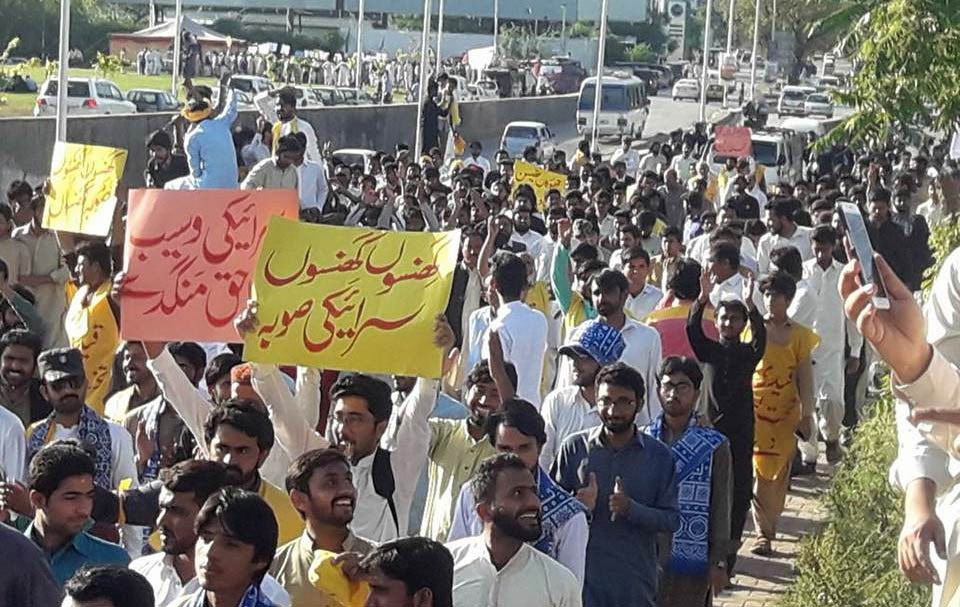
Wishing away Siraiki ethnicity is embedded in the very choice of nomenclature of the new province ‘South Punjab’. What lies in the nomenclature of a province?

In the early twentieth century, renowned German sociologist, philosopher, jurist, and political economist Max Weber termed ethnicity and nationalism a ‘primordial phenomenon’ the importance of which, according to him, would decrease and ultimately vanish due to factors like modernisation, industrialisation and individualism.
Like Weber, many social scientists held this point of view about ethnicity and nationalism. However, contrary to their imagination, ethnicity didn’t vanish with the expansion of modernity.
Instead after the Second World War an unprecedented surge in ethnic and nationalist struggles for recognition, power and autonomy proved it wrong.
In the second half of the twentieth century, we saw politics of ethno-nationalism and ethnic conflicts mushrooming across all the continents of the globe, taking both the developed and developing countries into its fold. In fact, the phenomenon of ethnicity continues into the twenty first century, showing no sign of submission to the forces of economic liberalisation and globalisation.
Pakistan has been no exception to the ethnic politics. In fact the ethnic undercurrents have been an ubiquitous feature of Pakistani polity since Independence. However, to deal with it, the power that be tended to respond by wishing it away, either by denying its existence or resorting to its violent suppression, which ultimately undermined the federation and the processes of national integration.
The question of ethnicity has resurfaced after April 9, when eight parliamentarians of Pakistan Muslim League-Nawaz (PML-N) hailing from Siraiki-speaking districts of Punjab quit the ruling party, resigned from their national and provincial assembly seats, formed South Punjab Province Front, and vowed to struggle for creation of a new province while setting the same agenda for their election campaign.
The issue of creating a new province has triggered a debate in the press, TV talk shows and political parties. Compared to the past, presently no major political party is overtly opposing the cause of creating a new province in Punjab.
Pakistan People’s Party (PPP) has been steadily championing the cause for long. During its last government, the PPP passed a bill in senate for carving out a new province from Punjab. Though the PML-N didn’t support the PPP in getting the bill passed by the National Assembly, the entire legislative process of the province created a political pressure, forcing the PML-N to pass a resolution in the Punjab Assembly for creating two new provinces -- Bahawalpur and South Punjab.
After the recent defection of its parliamentarians, the PML-N has started to reiterate its support for Bahawalpur and South Punjab provinces. Pakistan Tehreek-i-Insaf (PTI), which maintained a long silence on the issue till recently, has also joined the chorus to appease the defected PML-N parliamentarians.
Against this backdrop, a political consensus seems to be evolving not only on the creation of a new province but also on wishing away Siraiki ethnic identity. Howsoever paradoxical it may sound the word ‘Siraiki’ is fast disappearing in the debate on creation of a new province.
All major political parties are referring to the new province as ‘South Punjab’. Wishing away Siraiki ethnicity is embedded in the very choice of nomenclature of the new province. Pragmatically, creation of South Punjab province may be a more politically expedient option than the popular demand for Siraiki province. Agreed, but the question is whether this ‘non-ethnic’ nomenclature will ever be able to end the politics of Siraiki ethnic identity?
Creation of a new province is not as simple as drawing a few lines on a piece of paper and that is it. The whole exercise needs to be based on the realities of geography, natural resource base, economy, history, society, culture, language and, above all, the political aspirations of the people of the area.
The very expression of ‘South Punjab’ for the new province is intrinsically flawed. What exactly is South Punjab? South, a direction, is to be determined by the point from where it is referred to. If Lahore, the centre of power, is to be believed as the reference point, are Mianwali and Bhakkar, the pre-dominantly Siraiki speaking districts, located in South of Lahore? No. They are westward from Lahore. So if the avoidance of word ‘Siraiki’ is so inevitable, South Western Punjab seems a rather more appropriate expression.
With reference to Siraiki province, we often read and hear the politicians and media persons supporting ‘the new province on administrative not ethnic grounds.’ What sense does it make?
There is no denying the fact that all provinces are inherently administrative units. But the question is that whether we can regard any province of the country -- Sindh, Balochistan, Pakhtunkhwa and Punjab -- as ‘non-ethnic? Though being misrecognised, even the nomenclature of ‘South Punjab’ is not ‘non-ethnic’ per se.
North West Frontier Province was the only ‘non-ethnic’ nomenclature but we have seen how passionately the Pakhtuns struggled against this misrecognition and finally succeeded in getting the name of their province changed. Do we want the Siraikis to have a separate province first and then struggle for seventy long years for renaming it?
The point to be made here is that denial of Siraiki ethno-linguistic identity in the nomenclature of the new province is the reflection of old approach -- wishing away ethnicity -- that will serve no good to national integration and strengthening the federation.
Creating a new province is a new experience for Pakistan. To do it amicably, we will have to shed off this old approach and learn from the experiences of other countries, which have done successful experiments redrawing internal boundaries.
If the purpose of creating a new province is to redress the sense of deprivation among the Siraiki people, the first thing to be done is to recognise them.